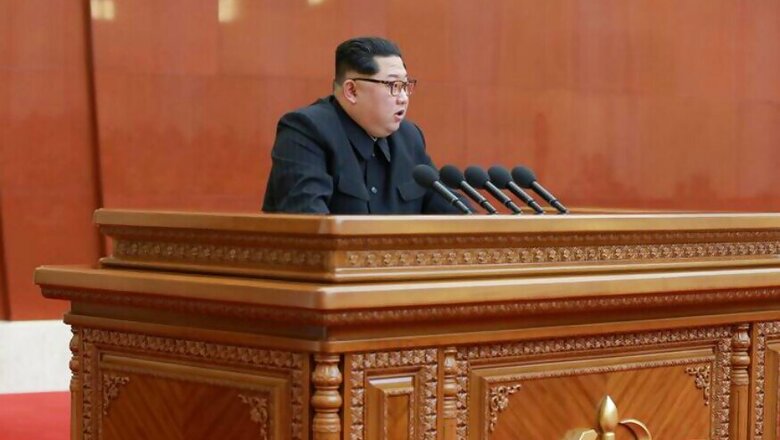
views
Seoul: North Korean leader Kim Jong Un has declared an end to the nuclear and intercontinental ballistic missile tests that sent tensions soaring on the peninsula, in the region, and beyond.
The move, enshrined in a decision by the ruling Workers' Party, comes ahead of a summit with the South's President Moon Jae-in next week, and with a much-anticipated meeting with US President Donald Trump due later.
But it is only one step in a complicated sequence of moves that has a long way to play out. Here are some questions and answers on the latest developments.
Does this mean Kim will give up his arsenal?
Not in the slightest. Kim explicitly said that the possession of nuclear weapons was "the firm guarantee by which our descendants can enjoy the most dignified and happiest life in the world".
The North also reserved itself the right to use atomic weapons if there were "nuclear threats and nuclear provocations" against it -- a threshold that falls short of an attack.
"I don’t see how North Korean statement constitutes a step toward denuclearisation," tweeted Christopher Green of the International Crisis Group. "It is a moratorium on testing, but recommits North Korea to nuclear weapons status."
Why is this announcement being made now?
Pyongyang's declaration comes less than a week before the inter-Korean summit, and it has been on a charm offensive for months with the South's Winter Olympics triggering a diplomatic rapprochement on the peninsula.
Kim first declared the completion of the country's nuclear force at the beginning of this year, and the North appears to believe last year's technological advances put it into a position of strength from which to negotiate.
At the same time analysts say it has been rattled by the belligerent rhetoric of the Trump administration, and according to diplomats sanctions are having an increasing impact on the economy.
The declaration of an end to testing has long been demanded by Washington, and will be seen as a confidence-building measure ahead of the talks.
Jon Wolfsthal, director of the Nuclear Crisis Group, said: "The DPRK is really eager both to ensure the summit happens and, if it fails, to build the case now that they bent over backwards to be reasonable."
Will there be a deal?
Trump warned last week that he would call off the Kim summit if it was unlikely to prove "fruitful".
But what an ultimate deal over Pyongyang's nuclear weapons might look like, and what it will demand in the form of security guarantees, remains deeply unclear.
And we have been here before — there have been declarations of a moratorium on testing, negotiations and even agreements in the past, but they have ultimately foundered sooner or later.
How significant is closing Punggye-ri?
All but one of the North's nuclear blasts have been carried out under Mount Mantap at the Punggye-ri nuclear test site in the northwest of the country, with landslides and earthquakes after the last blast leading to speculation it was suffering from "tired mountain syndrome".
Closing Punggye-ri does not preclude the use of other locations, or even atmospheric nuclear tests, MIT political scientist Vipin Narang pointed out.
But David Albright of the Institute for Science and International Security said the declared intention to "transparently guarantee" the end of testing was highly significant, opening the way to the US seeking access to the site.
"Transparency is critical and a key concession, if sincere."
How powerful is Pyongyang's arsenal?
Monitoring groups put the size of Pyongyang's sixth and last atomic blast in September at 250 kilotons -- 16 times the size of the US bomb that destroyed Hiroshima in 1945 and the kind of yield generated by a hydrogen bomb.
In a 2016 defence white paper, Seoul estimated the North had 50 kilograms of plutonium -- reportedly enough for about 10 bombs, and US estimates of its bomb numbers are said to be significantly higher.
The Hwasong-15 ICBM Pyongyang tested in November has an estimated range of more than 13,000 kilometres (8,000 miles), analysts say, bringing the whole of the US mainland within range.
There are still questions over its capabilities -- it has not demonstrated targeting abilities, miniaturisation of a warhead, or the re-entry technology needed to survive coming back into the Earth's atmosphere. But it claims to have mastered all three.
And whenever it holds a military parade, it puts scores of missiles and giant launchers on show rolling through Kim Il Sung square.

















Comments
0 comment